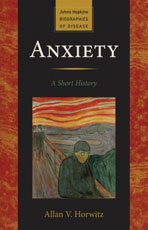In 2008 American physicians wrote more than 50 million prescriptions for anti-anxiety medications and more than 150 million for antidepressants, many of which were used for anxiety-related conditions. This biomedical model is growing even more popular as more and more people struggle with the river of emotions flowing through their minds and stirring up fear and dread. Anxiety shows no signs of fading away but seems to be spreading in combination with the increased stresses and worries of our times. Cognitive behavioral therapy (CBT) now constitutes the most popular alternative to biological approaches to anxiety.
Allan V. Horwitz is a professor of sociology who has written this erudite work for the Johns Hopkins Biographies of Disease series. With admirable conciseness, he takes us on a tour of the ways in which anxiety has been dealt with from the times of Hippocrates in Greece to the present scene. Along the way, Horwitz covers the journey from medicine to religion — and back; the nineteenth century's new uncertainties; the Freudian revolution; and psychology's ascendance.
We thought of a quotation from Marie Curie who wrote: "Nothing in life is to be feared. It is only to be understood." Horwitz gives us some history and some insights to allay our fears about anxiety. And in helping us to understand anxiety, he opens new doors to coping with it as a chronic condition.
